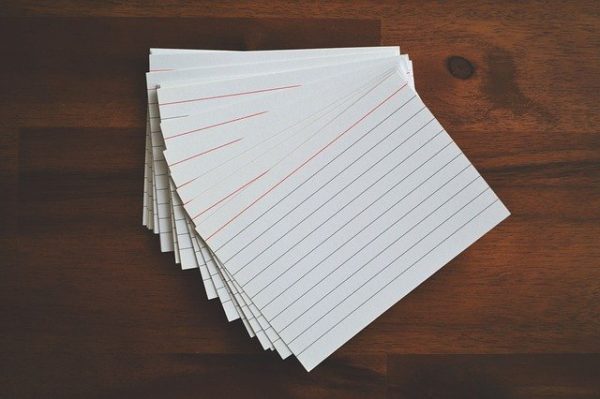Most people associate studying vocabulary with flashcards and hours spent staring at a dull book. This may be what a lot of people do, but these methods are outdated. Cramming is not how you remember words in a foreign language effectively.
There are several things you could do to make your vocabulary studies effective. Using modern teaching techniques, you can conquer your vocabulary list quickly and efficiently. We recommend these methods for successful memory exercises and fun.
How Memory Works
Before you can find out how you can remember words effectively, you need to know how memory works. It’s not as simple as long and short term memory.
Your brain is actively trying to forget. This is something Ebbinghaus called “The Forgetting Curve”. Imagine that you learn something new on Day 1. The next day, you’ve already begun to slowly forget it. By Day 7, you remember less than 20% of what you studied on the first day. This is a huge difference that prevents learners from remembering.
Luckily, there’s a way to offset “The Forgetting Curve”. This method is called spaced repetition. The best time to revisit the previous material is when you start to forget it. You also want to space those intervals out over time, revisiting material further and further apart. If you study on Day 1, for instance, then review on Day 3. That will bounce the curve back so you’ll remember the information a little longer. Then, as time goes on, you space those sessions out. This is the most effective way to remember your language lessons.

Actively Remember Words and Vocabulary
The traditional means of remembering words is largely passive. That is why it seems to take forever for you to commit things to memory – you’re basically pouring the information into your brain and hoping it stays without any further assistance. While this can work if you do it often enough, it is incredibly inefficient.
In contrast, active vocabulary study makes you process what you have learned, then organizes and structures it in a way that makes sense to you. Essentially, you are paraphrasing what you are learning so that it fits into your brain in a way that you can more readily access it.
Paraphrasing information can be done in many ways. Here are a few suggestions for ways to paraphrase what you are learning:
- Write it down in your own words as a summary.
- Create a cheat sheet that you can refer to as needed; the cheat sheet can be whatever structure you find the most helpful to review.
- Explain it to someone else. This is best done with another person since they can tell you if it makes sense, but you can also explain things to your dog or cat if you don’t have a person handy.
- Create a mental image of it. Visualization is key for committing things to memory. The visual can be of an object, a chart, a web, or even a map.
- Create a story and narrate the concepts. This can be very short, but make it memorable for the best results.
Find Other Sources
One of the most frustrating things about learning another language is that you are stuck with a book (at least in the beginning). If you use a book that is poorly written, you are going to have a very difficult time learning anything. Find another source and see if you can more easily understand the concepts the way that book presents them.
Even if you like the book or material you are using, find a couple of alternatives. By looking at the language from several different angles, it is more likely to leave a more lasting impression on your memory.
The following are some easily accessible sources that can enhance what you learn:
- Wikipedia
- YouTube
You will want to take what you learn with a grain of salt, but they give you some relatively reliable information since all of them use experts to update the information.

Use Mnemonics to Visualize a Story
People are visual and emotional by nature. When you have a mental image of something, it creates emotions (even if they are rather tepid emotions), enough that what you saw is more likely to stick with you. And if you have a set of vocabulary words you need to study, using mnemonics can help.
Mnemonics are a memory aid. By placing your list of words into a story, you have a higher chance of remembering those words. Recall time will increase too.
The problem is that not everyone is creative. It’s ok, you don’t have to be. Here are a few things you can do to make your stories more memorable.
- Create characters who are caricatures or exaggerations. When you are learning about colors, visualize characters who wear clothing that are obnoxiously obvious about the colors. When you exaggerate, your mind will hold the image better with what you are learning.
- Create a story around a concept. Make the stories crazy and strange so that you can remember exactly what you wanted to remember. This is particularly easy when you are learning verbs.
- Create analogies for the concepts. By equating the ideas to things that you know, your mind will latch on to the new ideas.
It will take a bit of getting used to these methods because you haven’t been taught to do this. However, it won’t take long before it is second nature, just like picking up a book and trying to remember its contents. The difference is that it is both more enjoyable and more efficient when you put ideas into stories.
Prioritize What Words You Remember
Not everything you study is of equal value. Of course, you cannot neglect the stuff you don’t like, but you can prioritize your learning in a way that makes it more natural for you to remember words.
If you already know something well, don’t start with it every study session. You already know it. Move on to the new stuff and start committing that to memory. It will make you feel less secure about what you know, but that is a good thing. Starting with what you do know gives you the wrong impression that you know the language well. The truth is you don’t. You just feel better because you know a small part of it.
These three tips will help you to better prioritize your vocabulary studies.
- Don’t study things you already know well and with which you feel comfortable.
- Spend more time with things that make you uncomfortable. It means you don’t know them and should be spending more time on them.
- Occasionally pull both the familiar and new material together to ensure you retain what you learned while pushing yourself into new territory.







